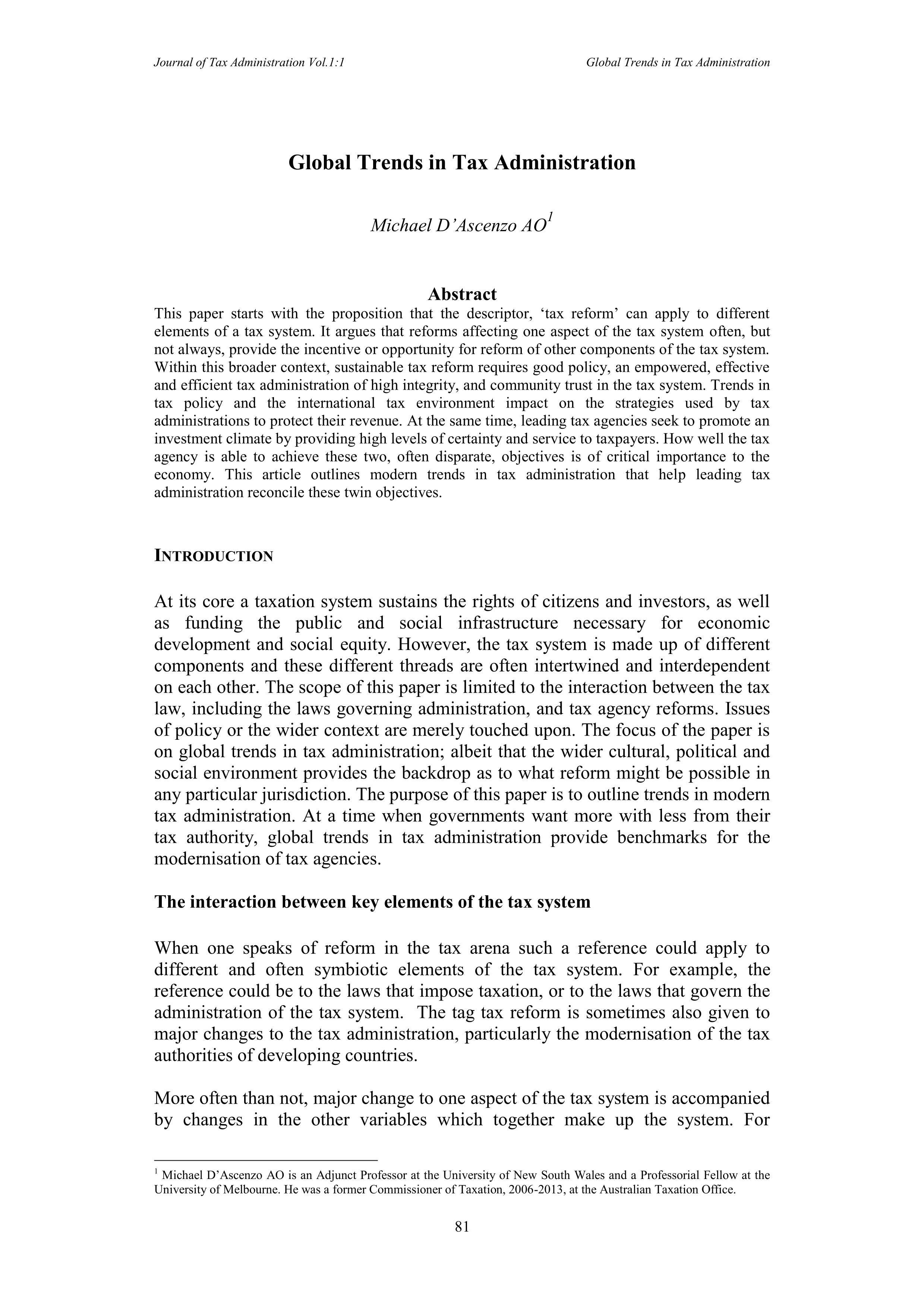Global Trends in Tax Administration
Abstract
This paper starts with the proposition that the descriptor, ‘tax reform’ can apply to different elements of a tax system. It argues that reforms affecting one aspect of the tax system often, but not always, provide the incentive or opportunity for reform of other components of the tax system. Within this broader context, sustainable tax reform requires good policy, an empowered, effective and efficient tax administration of high integrity, and community trust in the tax system. Trends in tax policy and the international tax environment impact on the strategies used by tax administrations to protect their revenue. At the same time, leading tax agencies seek to promote an investment climate by providing high levels of certainty and service to taxpayers. How well the tax agency is able to achieve these two, often disparate, objectives is of critical importance to the economy. This article outlines modern trends in tax administration that help leading tax administration reconcile these twin objectives.
References
Australian Tax Office for Commonwealth of Australia (2012). Tax Practitioner Action Plan. Australian Government.
Australian Taxation Office for the Commonwealth of Australia (2012). ‘The effective use of analytics in public administration: The ATO Experience’, Australian Government
Australian Commissioner of Taxation (2007), ‘The Rule of Law: a corporate value’, Law Council of Australia - Rule of Law conference.
Bakker, A., & Kloosterhof, S. (2009) ‘Tax Risk Management: From Risk to Opportunity’. Amsterdam, Netherlands: IBFD Leviner, S. (2009). ‘A New Era of Tax Enforcement: From 'Big Stick' to Responsive Regulation’, Michigan Law School, 42, 381-429.
Braithwaite, V. (2007). ‘Responsive Regulation and Taxation’, Law & Policy, 29(1), 3-10.
Evans, C. (2014). The fiscal outlook for South Africa: challenges and opportunities’, South African Institute of Tax Professionals, Tax Indaba 2014.
Ernst and Young (2007). Tax risk: External Change, Internal Change Global Tax Risk Survey 2006. Retrieved from https://www2.eycom.ch/publications/items/global_tax_risk_survey_2006/ey_global_tax_risk_survey_2006_e.pdf
Ernst and Young (2012). 2011-12 Tax risk and controversy survey, ‘A new era of global risk and uncertainty’. Retrieved from http://www.ey.com/GL/en/Services/Tax/2011-12-Tax-risk-and-controversy-survey; and
James, S., Murphy, K., & Reinhart, M. (2004). ‘Taxpayer’ Charter: A Case Study in Tax Administration’. Journal of Australian Taxation, 7(2), 336-356. Retrieved from http://69.195.124.80/~jausttax/?s=Taxpayer+charter+Case+Study+in+Tax+Administration
KPMG (2009). Tax Department Survey, Good, Better, Best: The race to set global standards in tax management. KPMG’s 2009 Tax Department Survey.
Lexis Nexis/Butterworths (2007). Tax Risk Management.
OECD (1990). Taxpayers’ Rights and Obligations. Centre for Tax Policy and Administration Tax guidance series. Paris, France: OECD Publishing.
OECD (2006). Using Third Party Information Reports to Assist Taxpayers Meet their Return Filing Obligations— Country Experiences With the Use of Pre-populated Personal Tax Returns. Forum of Tax Administration Taxpayer Services Sub-group. Centre for Tax Policy and Administration
OECD (2008). Study into the Role of Tax Intermediaries. Paris, France: OECD Publishing.
OECD (2009). Standard Business Reporting. Forum on Tax Administration Taxpayer Services Sub-Group. Retrieved from http://www.oecd.org/tax/administration/43384923.pdf
OECD (2011), ‘OECD Guidelines for Multinational Enterprises’. Paris, France: OECD Publishing http://dx.doi.org/10.1787/9789264115415-en.
OECD (2012). Right from the Start: Influencing the Compliance Environment for Small and Medium Enterprises. Forum on Tax Administration: SME Compliance Sub-Group.
OECD (2012). Working Smarter in structuring the administration, in compliance, and through legislation and Working smarter in revenue administration - Using demand management strategies to meet service delivery goals. Forum on Tax administration.
OECD (2013), Action Plan on Base Erosion and Profit Shifting, OECD Publishing. http://dx.doi.org/10.1787/9789264202719-en.
OECD (2013). Corporate Governance and Tax Risk Management. Forum on Tax Administration.
OECD (2013). Co-operative Compliance: A Framework. From Enhanced Relationship to Co-operative Compliance. Retrieved from http://www.oecd.org/ctp/administration/co-operative-compliance.htm
Parkinson, M. (2014). Fiscal sustainability & living standards - the decade ahead. The Sydney Institute, Sydney: Australia. Retrieved from http://www.treasury.gov.au/PublicationsAndMedia/Speeches/2014/Fiscal_sustainability
Preston, J. (2012), ‘Shaping the Tax System’, PWC Tax administration: Global Trends, 2012. Retrieved from https://www.pwc.com/en_GX/gx/tax/publications/assets/pwc-global-tax-policy-trends.pdf
Warren, N. A. (2004). ‘Tax: Facts, Fiction and Reform’ Tax facts and tax reform & Australian Tax Research Foundation, Sydney. “Australia’s Future Tax System” Report to the Treasurer, (December 2009), Commonwealth of Australia, 2010.

Downloads
Published
How to Cite
Issue
Section
License
Copyright (c) 2015 Michael D’Ascenzo

This work is licensed under a Creative Commons Attribution 4.0 International License.
Our open access status means that authors retain the copyright of their work. However, all papers published in JOTA are done so under a Creative Commons Attribution 4.0 International license (CC BY). This means that others can share and/or adapt your work without your permission as long as they follow certain rules, including attributing your work correctly.
You can learn more about this on our Open Access, Licensing, and Copyright Policies page.



